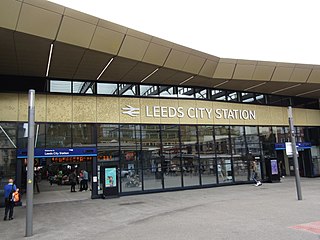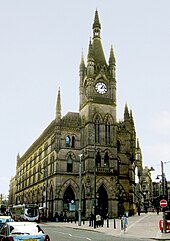
Manchester ( ) is a city and metropolitan borough of Greater Manchester, England, which had a population of 552,000 at the 2021 census. It is bordered by the Cheshire Plain to the south, the Pennines to the north and east, and the neighbouring city of Salford to the west. The city borders the boroughs of Trafford, Stockport, Tameside, Oldham, Rochdale, Bury and Salford.

Greater Manchester is a ceremonial county in North West England. It borders Lancashire to the north, Derbyshire and West Yorkshire to the east, Cheshire to the south, and Merseyside to the west. Its largest settlement is the city of Manchester.

Salford is a city in Greater Manchester, England. The city is situated in a meander on the western bank of the River Irwell which forms its boundary with Manchester and its city centre. Landmarks in the city include the old town hall, cathedral and St Philips Church. It is the main settlement of the wider City of Salford metropolitan borough.

The West Coast Main Line (WCML) is one of the most important railway corridors in the United Kingdom, connecting the major cities of London and Glasgow with branches to Birmingham, Manchester, Liverpool and Edinburgh. It is one of the busiest mixed-traffic railway routes in Europe, carrying a mixture of intercity rail, regional rail, commuter rail and rail freight traffic. The core route of the WCML runs from London to Glasgow for 399 miles (642 km) and was opened from 1837 to 1881. With additional lines deviating to Northampton, Birmingham, Manchester, Liverpool and Edinburgh, this totals a route mileage of 700 miles (1,127 km). The Glasgow–Edinburgh via Carstairs line connects the WCML to Edinburgh. However, the main London–Edinburgh route is the East Coast Main Line. Several sections of the WCML form part of the suburban railway systems in London, Coventry, Birmingham, Manchester, Liverpool and Glasgow, with many more smaller commuter stations, as well as providing links to more rural towns.

Irish people in Great Britain or British Irish are immigrants from the island of Ireland living in Great Britain as well as their British-born descendants.

Salford, also known as the City of Salford, is a metropolitan borough with city status in Greater Manchester, England. The borough is named after its main settlement, Salford, but covers a larger area which includes the towns of Eccles, Swinton, Walkden and Pendlebury. The borough had a population of 278,064 in 2022, and is administered from the Salford Civic Centre in Swinton.

Leeds railway station is the mainline railway station serving the city centre of Leeds in West Yorkshire, England. It is located on New Station Street to the south of City Square, at the foot of Park Row, behind the landmark Queens Hotel. It is one of 20 stations managed by Network Rail. As of December 2023, it was the busiest station in West Yorkshire, as well as in Yorkshire & the Humber, and the entirety of Northern England. It is the second busiest station in the UK outside of London, after Birmingham New Street.

BBC Children in Need is the BBC's UK charity. As of September 2023 and since 1980, it has raised over £1 billion for disadvantaged children and young people in the UK.

The history of Manchester encompasses its change from a minor Lancastrian township into the pre-eminent industrial metropolis of the United Kingdom and the world. Manchester began expanding "at an astonishing rate" around the turn of the 19th century as part of a process of unplanned urbanisation brought on by a boom in textile manufacture during the Industrial Revolution. The transformation took little more than a century.
The 2000–01 season was the 121st season of competitive football in England.
Gang-related organised crime in the United Kingdom is concentrated around the cities of London, Manchester and Liverpool and regionally across the West Midlands region, south coast and northern England, according to the Serious Organised Crime Agency. With regard to street gangs the cities identified as having the most serious gang problems, which accounted for 65% of firearm homicides in England and Wales, were London, Birmingham, Manchester and Liverpool. Glasgow in Scotland also has a historical gang culture with the city having as many teenage gangs as London, which had six times the population, in 2008.

The economy of Leeds is the most diverse economy of all the UK's main employment centres and has seen the fastest rate of private-sector jobs growth of any UK city and has the highest ratio of public to private sector jobs of all the UK's Core Cities. Leeds has the third-largest jobs total by local authority area with 480,000 in employment and self-employment at the beginning of 2015.

The second city of the United Kingdom is typically held to be either Birmingham or Manchester, between which the title is disputed. The title is unofficial and cultural and is often debated in the popular press between Birmingham, Manchester, and other candidates.

The transport infrastructure of Greater Manchester is built up of numerous transport modes and forms an integral part of the structure of Greater Manchester and North West England – the most populated region outside of South East England which had approximately 301 million annual passenger journeys using either buses, planes, trains or trams in 2014. Its position as a national city of commerce, education and cultural importance means the city has one of the largest and most thorough transport infrastructures which is heavily relied upon by its 2.8 million inhabitants in the Greater Manchester conurbation and further afield in the North West region. Public transport comes under the jurisdiction of Transport for Greater Manchester.
A large number of places in the U.S were named after places in England largely as a result of English settlers and explorers of the Thirteen Colonies.

Urban andsuburban rail plays a key role in public transport in many of the major cities of the United Kingdom. Urban rail refers to the train service between city centres and suburbs or nearby towns that acts as a main mode of transport for travellers on a daily basis. They consist of several railway lines connecting city centre stations of major cities to suburbs and surrounding towns.

A series of mayoral referendums were held on 3 May 2012 in England's 11 largest cities to determine whether to introduce directly elected mayors to provide political leadership, replacing their current council leaders, who are elected by the local council.

The 2012–13 FA Cup was the 132nd season of the FA Cup, the main domestic cup competition in English football, and the oldest football knock-out competition in the world. It was sponsored by Budweiser for a second consecutive season, thus the competition name was The FA Cup with Budweiser.

The 2012–13 Football League Cup was the 53rd season of the Football League Cup, a knock-out competition for the top 92 football clubs played in English football league system. Liverpool were the defending champions, having beaten Cardiff City in the 2012 final. They were knocked out in the fourth round by Swansea City.


























